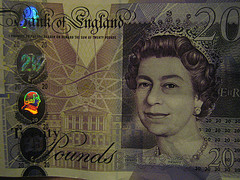3. Isabel and Antonio were getting excited with the travel
Paco's parents were getting excited with the travel. It wasn't the first time that Paco was travelling abroad but this time was different. They knew that their son was to be far away for a long time.
But Paco wasn't getting so excited as his parents. He was reading a lot about Great Britain, London and other main British cities. He was buying some books while his parents were trying to pack his luggage. They were hesitating about the most suitable things for Paco to take with him.
 |
| By striatic. Creative Commons |
Paco was thinking about how much money he had to exchange for his trip. How much would a pound sterling be?
We'll see that later.
Can you recognize any Past Continuous affirmative form in the text? Sure you can.
- Paco __________ (to learn) the currencies of some European countries before the travel.
- Alex and Andrés __________ (to help) Paco with the travel.
- Sonia __________ (to try) to buy a good bilingual dictionary for his brother.
- Antonio and Isabel __________(to buy) lots of things for Paco.
- Paco __________ (to change) euros into sterling pounds.
Put the verbs in brackets in the affirmative form of the past progressive tense.
Read the paragraph below and fill in the missing past continuous affirmative forms.
Paco with the journey. Everybody in his family him. Sonia Paco a hand with the shopping of some books, guides and maps about Britain. Antonio and Isabel Paco's luggage. His friends in the Internet some useful information for Paco.
The full, official name, pound sterling, (plural: pounds sterling) is used mainly in formal contexts and also when it is necessary to distinguish the United Kingdom currency from other currencies with the same name. Otherwise the term pound is normally used. The currency name is sometimes abbreviated to just sterling, particularly in the wholesale financial markets, but not when referring to specific amounts; for example, "Payment is accepted in sterling" but never "These cost five sterling".


By Neil Mallett. C. Commons
Gazh. Creative Commons
The abbreviations "ster." or "stg." are sometimes used. The term British pound is commonly used in less formal contexts, although it is not an official name of the currency. A common slang term is quid (singular and plural) which is thought to derive from the Latin phrase "quid pro quo".The currency sign is the pound sign, originally ₤ with two cross-bars, then when the currency was decimalised £ with a single cross-bar. The pound sign derives from the blackletter "L", an abbreviation of Librae in Roman £sd units (librae, solidi, denarii) used for pounds, shillings and pence in the British pre-decimal duodecimal currency system. Libra was the basic Roman unit of weight, derived from the Latin word for scales or balance.
For further practice with exercises on Past Progressive or continuous, click here.
A brief explanation to refresh your knowledge of the Past Continuous.